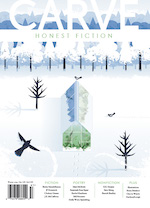Rachel Kaufman will graduate from Yale University in May with a BA in English and History. Her work has appeared in The Yale Daily News and The New Journal. She is now writing an archival poetry collection about memory of crypto-Jews in New Mexico.
Rachel’s poem “Starfish” will appear in the Winter 2019 issue of Carve. Preorder or subscribe by Sunday, January 13, for special savings.
What's your relationship to beachcombing?
I have visited Sanibel Island many times since I was a kid, spending the days looking for shells, and sometimes sea life, with my sister. We are avid collectors, walking along the beach until our necks hurt from looking down. We have different techniques—she likes to go in the water and squint while I like to stay on shore and walk back and forth, waiting for new arrivals. I have seen older people scouring the beach for other objects, sometimes using nets or jars to hold sea glass, other times dragging magnetic detectors along the sand. I became fascinated by these characters, by both the seekers and that which was found.
The final couplet troubled me at first. It's a dramatic shift in atmosphere and ratchets up the stakes of the poem abruptly so that, as a reader, I was forced to reevaluate my perception of the rest of the piece and the preconceptions that may have catalyzed that perception. Do you see the couplet as counterbalancing the rest of the poem, or do you see it as contiguous?
The final couplet stems from those that came before it. Small moments of violence—the silver skimming the starfish, the limbless form—sit alongside images of absence, departure, and disappointment. The poem wrestles with the temporally difficult quality of expectation; each moment comes too late or too soon. For me, the final couplet recalls the opening line of the poem; the beach is a site of displacement, of mistranslated arrival. The poem ends less concerned with what has been found, that which was not sought, than with what has not been found. The quarters in their pockets are recompense, not triumph.
You sing classical music. What song would you choose to warm up with before reading this poem?
In my mind, this poem is quiet and melodic, filled with longing and yet contained within the boundaries of its language. “Après un rêve,” an 1878 art song by French composer Gabriel Faure, occupies a similar world. The melody rises only to fall prematurely, the vowels are long and wistful. The song contains an underlying energy which propels it forward, arriving bitterly at a command: reviens, reviens, or come back, come back!
But immediately following the desperate plea, the song quietly returns to its former melody, as if it had never been interrupted, as if the interruption were merely a marking of time.The song opens up a singer’s lungs, creating room for quiet anguish and, ultimately, for poetry. In the poem, the splendours of the world are revealed to be a mere daydream, but the melody glides along, ending gently in the lower part of a soprano’s register.
“Après un rêve” does not announce its poetics, but desire and nostalgia surface in the music’s circularity and the way in which notes are held just a little too long. It is a difficult song to sing because it is hard to let go of each note. I am tempted to lounge in each moment of beauty, each mirage. I don’t think “Starfish” is quite so indulgent, but I would sing Faure’s song before reading the poem out loud to allow myself to move more slowly.
What are you working on now?
I am currently working on a collection of archival poetry, grounded in the history of crypto-Jews in New Mexico and the Mexican Inquisition. Academically, I am interested in memory studies, the ways in which literary and historical texts transmit the past, and the ways in which religious and cultural identity rely on remembering.
Sifting historical content through the poetic line pushes my work, making more difficult the pressures of rhetoric against form, story against melody. Poetry, however, has also proved a useful tool for remembering and recording history. Poetry is able to hold nostalgia, to preserve the past selectively and rewrite that which has been overwritten. In a way, “Starfish” touches on these questions, illustrating the beach as a home for recollections, for displaced objects and nostalgic remnants, waiting to be picked up and deposited in pockets and on window frames.
I am hoping the collection will balance the personal with the historical, authentically preserving the voices of the past while bringing them into the present to mingle, wander, and adapt. The project will weave together maternal oral histories from my own family with Inquisitional voices and stories of Jewish preservation. I aim to demonstrate the multidirectionality of memory (to use scholar Michael Rothberg’s language) and the ways in which memory can, and should, be filled with empathy.

